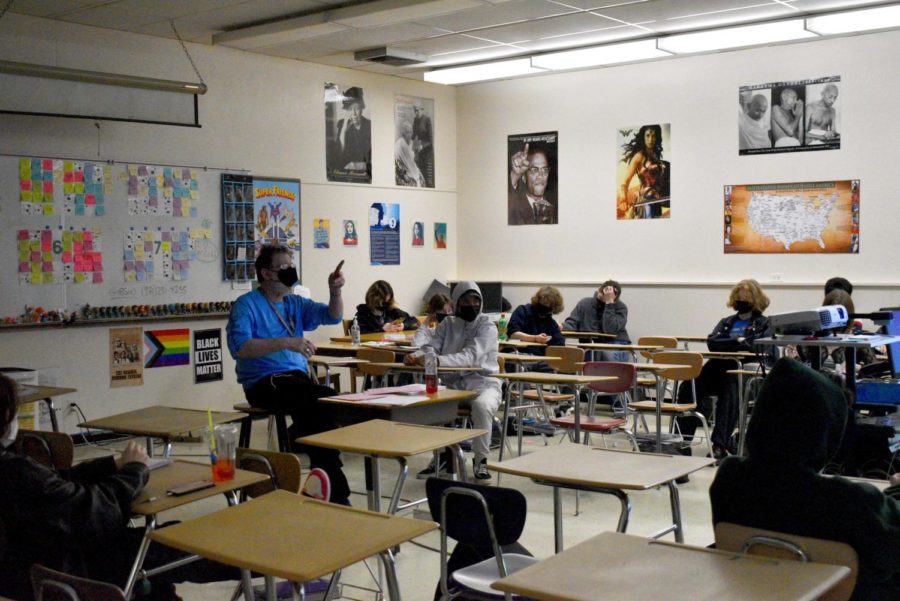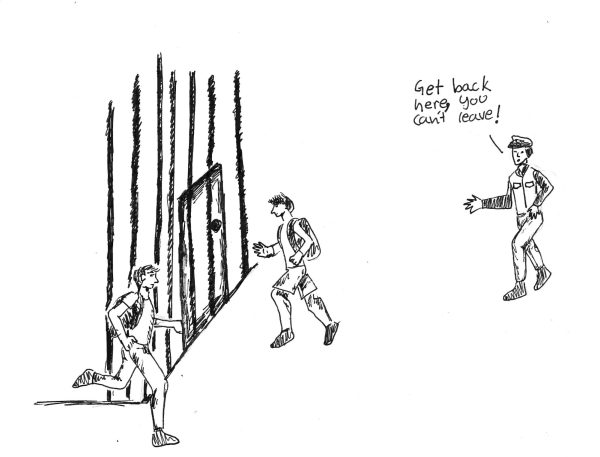PPS Faces Staffing Crisis
Clarion photo Anna Suydam
Mr. Sten Modern World History, Hector Cobb, the rapping sub, taking over for Stens absence
The 2021-2022 school year, among other things, has been altered in numerous ways due to the COVID-19 Pandemic, with staffing issues being a prominent concern. Understaffed schools and substitute teacher shortages have been ravaging the Portland Public district and beyond, leading to educational difficulties and even temporary closures.
One such closure occurred on Thursday, Jan. 6, 2022, when PPS announced that Cleveland and McDaniel High School would transition to a week of online learning due to staffing shortages. 28 percent of staff at Cleveland and 20 percent at McDaniel called in absent on Friday, Jan. 7. An increase in student absences and labor disagreements between the Portland Association of Teachers (PAT) and PPS influenced this shift to temporary distance learning. Teachers wanted more planning time to be built into the school day and up to six more non-instructional planning days, citing emotional exhaustion and an increased workload. PPS offered additional early release days and FLEX periods, concerned about the toll of online learning on students’ health. However, negotiations stalled over winter break. As tensions between PAT and PPS persist, it’s uncertain what future schedule changes will be implemented.
With the ongoing impacts of the COVID Pandemic, more positions in PPS have gone unfilled. As PAT president Elizabeth Thiel wrote in a letter to educators, “This staffing crisis pre-dates the pandemic, and it’s a reflection of our unsustainable working conditions and the deterioration of student support in our school. Together, they pose a real threat to the viability of our public school system.”
This year, PPS has seen a historic shortage: 146 certified positions are posted and yet unfilled. The scope goes beyond classroom teachers; the district has 40 custodian staff, 30 nutrition service staff, 80 paraeducators and educational assistants, 20 bus drivers, and many administrator positions unfilled. With the heightened shortage, teachers and students alike are bearing the impacts: teachers are further stretched thin and the students are suffering from the lack of imperative resources. The shortage is more than temporarily unfilled jobs, it is the long-term livelihood and success of the Portland school district and its community.
Additionally, Oregon is experiencing a statewide substitute shortage. Prior to the COVID Pandemic, in December 2019, Oregon had 8,300 active substitute licenses; by October 2021, it had 4,738. In September of 2021, Oregon Teacher Standards and Practices Commission filed a temporary rule to implement an emergency substitute teaching license. As such, degree requirements for substitute teachers have been relaxed–anyone with a high school diploma can now become a substitute teacher. This change comes after a growing number of unfilled staffing positions in Oregon.
PPS has a pool of 600 substitute teachers, but this has proved to be insufficient in wake of the pandemic. Some of these educators are already in long-term positions, and this combined with the increase of staff absences has left many classrooms without a teacher this year. Solutions have included “deploying central office staff to help with classroom support,” according to KATU news. This shift in staff arrangement interferes with the functioning of schools, as office staff have crucial jobs as well. As of January, PPS hoped to add 200 subs to the pool due to emergency rules. Additionally, PAT has reportedly asked the district to make an accessible plan for parents who want to volunteer in schools. COVID notwithstanding, the sub application process can be a tedious one, and it is hard to find prospects for the job. For many, COVID has been the final push out of an already draining job.
During the staffing crisis, special education programs have been hit especially hard. Even prior to the pandemic, it was difficult for the district to find paraeducators. “I feel like the challenges I’m going to bring up, we could have talked about three years ago,” Mary Darin (a PPS speech-language pathologist) told KGW. “There has been, for a while, a lack of special education funding and support and staffing.” These disparities have been exacerbated by the pandemic, resulting in over a dozen long-term vacancies of special education teachers and school psychologists throughout the district. With an insufficient amount of staff who are stretched thin, it is subsequently harder for students–who have higher academic and social needs due to the pandemic–to access support.
Students, teachers, and administrators alike are undoubtedly struggling from the lasting effects and continuous turmoil of the pandemic. As staffing shortages and labor issues sweep the nation, Portland Public Schools must continue to adapt to the ever-changing climate of the education system and economy.







